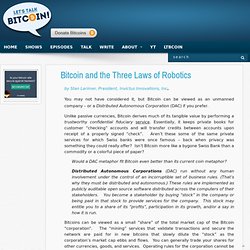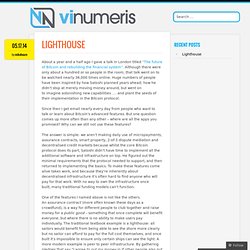

Assembly Coins. Bitcoin: the Stripe perspective. Many people have remarked that Bitcoin resembles the internet in the early 90s: we haven’t yet built the Googles that will make it accessible or the Facebooks and Netflixes that will make it broadly useful.

So it's an open question: what might a Bitcoin that's useful for the mainstream look like? Money. Bitcoin and the Three Laws of Robotics. By Stan Larimer, President, Invictus Innovations, Inc.

You may not have considered it, but Bitcoin can be viewed as an unmanned company – or a Distributed Autonomous Corporation (DAC) if you prefer. Unlike passive currencies, Bitcoin derives much of its tangible value by performing a trustworthy confidential fiduciary service. Essentially, it keeps private books for customer “checking” accounts and will transfer credits between accounts upon receipt of a properly signed “check”. Aren’t these some of the same private services for which Swiss banks were once famous – back when privacy was something they could really offer? [Bitcoin Day] Le Bitcoin, bien plus qu'une "monnaie"
Au printemps 2013, au moment de la crise chypriote et du blocage des dépôts bancaires, le bitcoin connaissait un essor sans précédent.
![[Bitcoin Day] Le Bitcoin, bien plus qu'une "monnaie"](http://cdn.pearltrees.com/s/pic/th/bitcoin-frenchweb-frfrenchweb-85464409)
Les adeptes de la crypto-monnaie se sont multipliés de façon exponentielle, puis, le cours du bitcoin s’est emballé, et connaît depuis une forte volatilité. L’une des explications de ce soudain engouement touche à l’un des fondamentaux de tout système économique: la confiance. A l’heure où la confiance dans les institutions bancaires – et par extension en nos monnaies – fait parfois résolument défaut, le Bitcoin repose sur un protocole informatique transparent, sécurisé et surtout dont personne ne peut prendre le contrôle unilatéralement. Si, jusque là, le Bitcoin a largement été évoqué en tant que monnaie, il est en fait davantage un système de transaction certifié. C’est un peu comme si la confiance des acteurs économiques dans les institutions financière centrales était remplacée par une confiance en un protocole informatique. Try Bitcoin! - What Is Bitcoin? Game Theory, Assurance Contract and Crowdfunding via Bitcoin. One of my majors in college was international politics, and among the course requirements were a number of classes on game theory.

It was one of the most interesting parts of my coursework, but I am sure I wouldn’t have believed it if I’d been told that a few years later I’d be spending an afternoon, of my own volition, writing about using the Bitcoin protocol to create assurance contracts. The free rider problem in game theory posits that there are situations in which the creation of a public good (for example, building a road) will provide utility to a group of people and leave everyone better off.
However, if there is no way of excluding those who did not contribute, many will make the rational decision to not pay and yet still reap the benefits of others’ contributions. In some cases this means that the public good will not be created, and utility is lower for everyone. Assurance contracts represent a way of solving the issue by ensuring that people actually contribute. Bitcoin: It’s the platform, not the currency, stupid! This research is courtesy of Sander Duivestein, professional speaker and trendwatcher at VINT, the International Research Institute of Sogeti, and Patrick Savalle, founder and technical director at Mobbr crowd payments. Bitcoin is big news again. The digital cryptocurrency is on the frontpage of every major newspaper. This week its price collapsed because the largest exchange on the network did not handle a known design flaw in bitcoin properly, which caused widespread disruption and possibly some loss of bitcoin. As a precaution, several exchanges had to close their virtual doors till further notice.
Economists have warned of the above scenario several times. But there is more to the story than the economists tell. It’s the underlying platform, the Bitcoin protocol aka Bitcoin 2.0, that holds the real transformative power. From dumb to smart money The Bitcoin protocol is the underlying platform that holds the real transformative power and is where the revolution starts. Lighthouse. About a year and a half ago I gave a talk in London titled “The future of Bitcoin and rebuilding the financial system”.

Although there were only about a hundred or so people in the room, that talk went on to be watched nearly 36,000 times online. Huge numbers of people have been inspired by how Satoshi planned years ahead; how he didn’t stop at merely moving money around, but went on to imagine astonishing new capabilities …. and plant the seeds of their implementation in the Bitcoin protocol. Since then I get email nearly every day from people who want to talk or learn about Bitcoin’s advanced features. But one question comes up more often than any other – where are all the apps you promised? Why can we still not use these features? One of the features I named above is not like the others. DecentralizedApplications/README.md at master · DavidJohnstonCEO/DecentralizedApplications.
How Bitcoin Works Under the Hood.